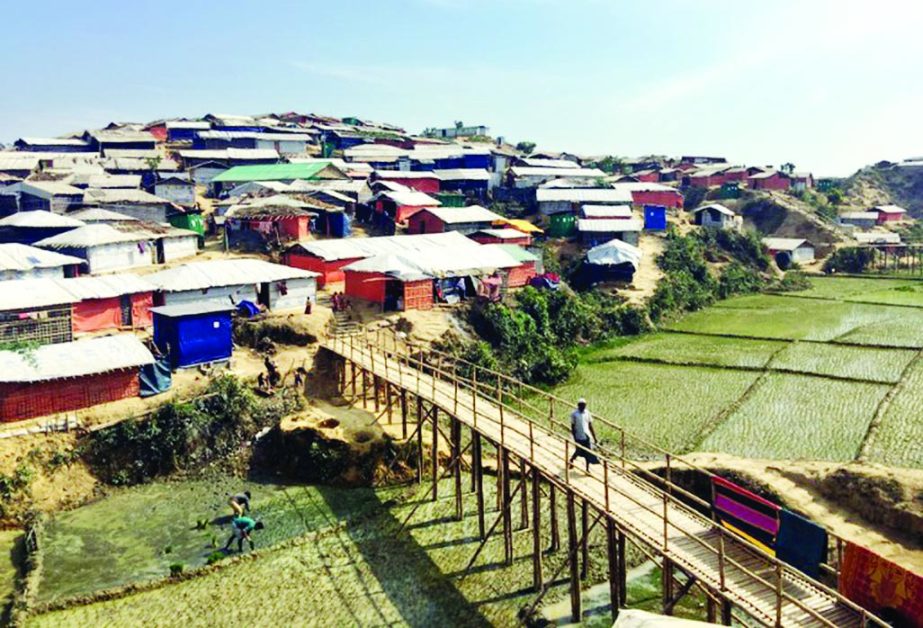
The decision to sign a Memorandum of Understanding (MoU) between United Nations agencies and Myanmar is being seen as a first and necessary step since the “conditions are not yet conducive” for return of Rohingyas, says the United Nations.
United Nations agencies and Myanmar have agreed a framework which it is hoped will lead to the repatriation of Rohingya refugees, but only if their “voluntary, safe, dignified and sustainable” return from camps in Bangladesh can be guaranteed, according to UN News Center.
Since August last year, some 700,000 mainly-Muslim Rohingya have fled Rakhine State, in majority-Buddhist Myanmar, for Bangladesh.
Most say, according to UN News Center, they were fleeing violence and persecution, including a military campaign by Myanmar forces, which began in response to violent attacks by Rohingya insurgents.
The agreement – reached by the Office of the UN High Commissioner for Refugees (UNHCR), the UN Development Programme (UNDP) and the Government of Myanmar – will be officially signed within a week or so, with the exact date to be confirmed, the UN says.
Under the agreement, UNHCR and UNDP will be given access to Rakhine State, including to refugees’ places of origin and potential new settlement areas, that so far the UN has been unable to access since the violence escalated last August.
The access, once effective, will allow UNHCR to assess local conditions and help the refugees to make informed decisions on voluntary return.
The agreement will also allow the two UN agencies to carry out needs assessments in affected communities and strengthen the capacity of local authorities to support the voluntary repatriation process. The Advisory Commission on Rakhine State – a neutral and impartial body composed of six local experts and three international experts, chaired by former UN Secretary-General Kofi Annan – has proposed concrete measures for improving the welfare of all people in Rakhine State.
Its recommendations include establishing a clear and voluntary pathway to citizenship and ensuring freedom of movement for all people there, irrespective of religion, ethnicity or citizenship status.
Meanwhile, the UN migration agency, known formally as the International Organization for Migration (IOM), is helping Rohingya refugees in Cox’s Bazar, Bangladesh, properly prepare for the monsoon season, which is getting underway, said the UN News Center. Radios, megaphones, first aid kits, stretchers, protective clothing, warning flags and sirens are among the items being distributed to more than 500 Rohingya emergency volunteers in the largest camp there.
With most of the refugees forced to live on steep and sandy slopes in low-lying hills, surveys by IOM and other agencies have found that around 200,000 people will be in serious danger from landslides and serious flooding when the worst monsoon weather arrives.
Reuters adds; Myanmar is willing to take back all 700,000 Rohingya Muslim refugees who have fled to Bangladesh if they volunteer to return, the country’s National Security Adviser Thaung Tun said on Saturday.
He was speaking at the Shangri-La Dialogue, a regional security conference in Singapore, where he was asked if the situation in Myanmar’s Rakhine state, where most Rohingya live, could trigger use of the Responsibility to Protect framework of the United Nations.
The so-called R2P framework was adopted at the 2005 UN World Summit in which nations agreed to protect their own populations from genocide, war crimes, ethnic cleansing and crimes against humanity and accepted a collective responsibility to encourage and help each other uphold this commitment.
“If you can send back 700,000 on a voluntary basis, we are willing to receive them,” Thaung Tun said. “Can this be called ethnic cleansing?
“There is no war going on, so it’s not war crimes. Crimes against humanity, that could be a consideration, but we need clear evidence. These serious charges should be proved and they should not be bandied about lightly.”
Since August 2017, about 700,000 Rohingya Muslims have fled a military crackdown in mainly Buddhist Myanmar, many reporting killings, rape and arson on a large scale, UN and other aid organisations have said.
The United Nations and aid agencies have described the crackdown on the Rohingya as “a textbook example of ethnic cleansing”, an accusation Myanmar rejects.
Myanmar and Bangladesh agreed in January to complete the voluntary repatriation of the refugees within two years.
Myanmar signed an agreement with the United Nations on Thursday aimed at eventually allowing the Rohingya sheltering in Bangladesh to return safely and by choice.
It also said it would set up an independent commission to investigate “the violation of human rights and related issues” in Rakhine State following the army operation there in response to attacks by Rohingya insurgents on security posts. Thaung Tun said that the narrative of what happened in Rakhine was “incomplete and misleading”. “Myanmar does not deny that what is unfolding in northern Rakhine is a humanitarian crisis,” he said. “There is no denying that the Muslim community in Rakhine has suffered. The Buddhist Rakhine, Hindu and other ethnic minorities have suffered no less.”
He said that while the military had the right to defend the country, if investigations showed they had acted illegally, action would be taken.

